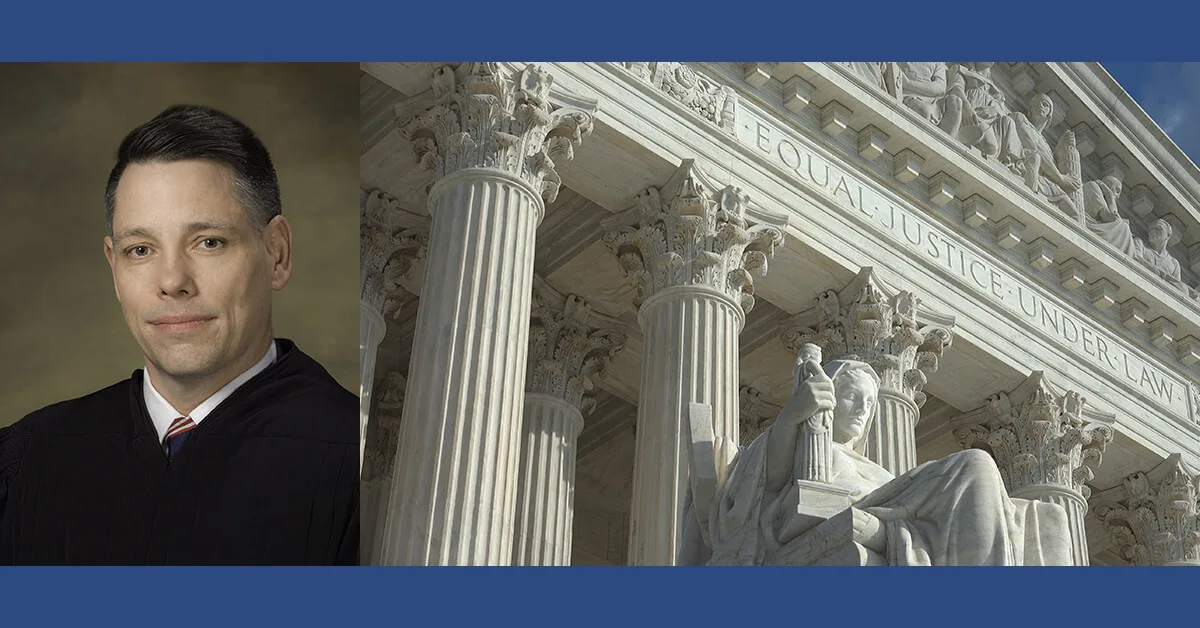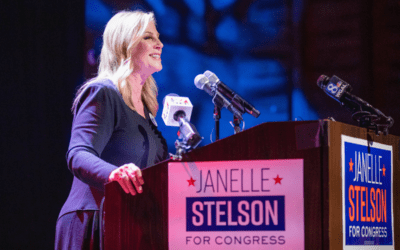
Pennsylvania jurist Peter Phipps is on Trump's shortlist of candidates for the US Supreme Court. (Photo via US District Court for the Western District of Pennsylvania)
Peter Phipps has served as a federal judge for only two years, but he has risen quickly—and over the objections of one of his home state senators.
While some have expressed surprise that President Donald Trump would announce a Supreme Court nominee so soon after the death of Justice Ruth Bader Ginsburg, it’s clear he has been thinking about it for quite some time.
Nine days before Ginsburg’s death, Trump updated his list of his candidates for the Supreme Court of the United States.
On the list of about 20 candidates was Pennsylvania jurist Peter Phipps.
RELATED: Trump to Announce Supreme Court Pick by Saturday, Ginsburg Services Set
Trump has since said he wants to appoint a woman to the nation’s highest court, and he interviewed Illinois jurist Amy Coney Barrett on Monday night. But Trump has not publicly ruled out any of the candidates, and he has more interviews scheduled this week.
Who is Peter Phipps?
Peter Phipps is one of the most recently appointed judges on the United States Court of Appeals for the Third Circuit.
The court, based in Philadelphia, serves Pennsylvania, New Jersey, and Delaware. The court has 14 active judges. Trump nominated Phipps to the court in summer 2019, and the Senate confirmed the appointment in July 2019.
Before Phipps joined the Third Circuit bench, he served in the US District Court for the Western District of Pennsylvania in Pittsburgh for several months.
Phipps, 47, has worked as a lawyer with Jones Day; law clerk for Judge R. Guy Cole Jr., of the US Court of Appeals for the Sixth Circuit in Cincinnati, Ohio; and later as an attorney in the Civil Division of the US Department of Justice, according to his biography on the Federal Judicial Center website. He also has taught law as an adjunct professor at Duquesne University.
Phipps has bachelor’s degrees in physics and history from the University of Dayton and a J.D. from Stanford Law School.
Opposition to Phipps’ Appointment to the Third Circuit Court
While the Senate unanimously confirmed Phipps to the US District Court for the Western District of Pennsylvania, with the recommendations of Sens. Bob Casey and Pat Toomey, Casey withdrew his support for Phipps when it came time to confirm him to the US Court of Appeals for the Third Circuit.
Casey said at the time that he did not believe Phipps’ short service on the federal bench gave him the experience he needed to sit on the higher court.
“Like justices of the Supreme Court, circuit court judges are often asked to decide questions of law that can have an enormous impact on Americans’ lives, and I have significant concerns about Judge Phipps’ judicial and constitutional philosophy,” Casey said in a statement.
Traditionally, Casey’s refusal to support Phipps would have prevented his appointment to the Third Circuit court. With the Senate under Republican leadership, it did not.
RELATED: Biden in PA: ‘Let the People Speak’, Wait on Supreme Court Nomination
Several organizations, including the Leadership Conference on Civil & Human Rights and the Alliance for Justice, also opposed Phipps’ appointment.
The Alliance for Justice reviewed Phipps’ short service as a judge in the US District Court for the Western District of Pennsylvania, and found that Phipps had authored only eight judicial opinions.
The organization raised concerns about Phipps’ record on reproductive rights, LGBTQ rights and housing discrimination as an attorney for the US Department of Justice.
In October 2018, as the lead attorney for the Department of Justice in ACLU v. Azar, Phipps defended a Department of Health and Human Services policy to provide grants to religious institutions that care for unaccompanied immigrant children and victims of human trafficking, even though these organizations had “religious objection[s] to providing access to abortion or contraception.”
About a decade earlier, Phipps defended the discharge of a nurse from the U.S. Air Force under “Don’t Ask, Don’t Tell.”
Phipps also represented the US Department of Housing and Urban Development in Thompson v. United States HUD. In that 2005 case, the court found that HUD had violated the Fair Housing Act through its practice of concentrating Black public housing residents in Baltimore in the most impoverished parts of the city.
The Leadership Conference on Civil & Human Rights raised concerns about Phipps’ sensitivity to transgender individuals.
When senators asked Phipps if he would honor a transgender person’s request to be referred to by a specific pronoun, Phipps said he would review court records and briefings to determine what was the appropriate pronoun to use.
The conference also raised concerns about the “disturbing lack of diversity” among Trump’s nominees in general, and to the Third Circuit court in particular. Phipps was the fourth conservative white man Trump nominated to the Third Circuit court.
What is Phipps’ Record on the Third Circuit Court So Far?
Phipps has served on the United States Court of Appeals for the Third Circuit for a little over a year.
In June, Phipps cast the deciding vote in Yucis vs. Sears Outlet Stores, which affirmed the dismissal of a woman’s complaint that a Sears employee sexually harassed her while she was shopping in a store in a Sears store in New Jersey. It is illegal in New Jersey for store employees to sexually harass customers.
Phipps then doubled-down on his vote and added a concurring opinion, stating that the complainant lacked “plausible allegations” that the Sears employee’s conduct was “designed to discourage” her from shopping there.
In August, Phipps dissented from a panel decision in Diamond v. Pennsylvania State Education Association that held that public-sector unions do not have to pay back fees collected from non-members.

For Rep. Susan Wild, supporting PA families includes reproductive rights and much more
Rep. Susan Wild wants to be very clear with Pennsylvanians: Donald Trump is committed to taking away women’s reproductive freedom, but he is not...

School districts working with anti-LGBTQ groups can cost your kids’ schools millions
Parents across South Central Pennsylvania are worried about the potential financial impacts working with anti-LGBTQ groups may have on their school...

VIDEO: Trump distances himself from his anti-abortion views
Donald Trump appeared on WGAL on Tuesday and continued to distance himself from his anti-abortion views claiming that reproductive rights are now a...

VIDEO: Community pushback gets school board to rescind decision on denying gay actor’s visit
Cumberland Valley School Board offered a public apology and voted to reinstate Maulik Pancholy as a guest speaker a week after the board voted to...

VIDEO: Project 2025 brings nuclear armageddon back into vogue
Project 2025 is a titanic document, with plans ranging from cutting half of all government employees to targeting reproductive rights on a scale...




